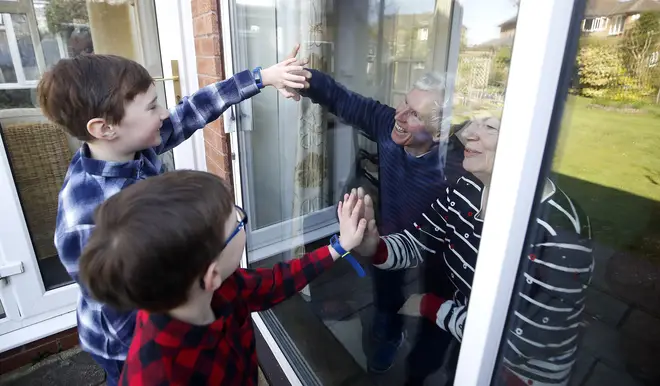
Iain Dale 7pm - 10pm
11 December 2020, 12:04 | Updated: 11 December 2020, 15:31

The self-isolation period for those who have come into contact with someone who tested positive for Covid and international arrivals will be cut from 14 to ten days from Monday.
Those required to quarantine after returning from countries which are not on the travel corridor list will also see their isolation period reduced, in an approach agreed by all four nations.
Health chiefs said in a joint statement that following a review of the evidence, they were "confident" that the self-isolation period could be shortened.
Read more: Mass testing rolled out at secondary schools for worst-hit areas of London, Kent and Essex
Read more: London faces 'tipping point' in Covid fight as Mayor unveils new measures
This reduction already applies in Wales following an announcement by the Welsh Government earlier this week, while it will take effect in England, Scotland and Northern Ireland from Monday.
The new rules will apply to all those who are currently self-isolating, including those who began doing so before Monday.

Secondary school pupils in worst affected areas to get Covid tests
"Self-isolation is essential to reducing the spread of Covid as it breaks the chains of transmission," a joint statement by the health chiefs said.
"After reviewing the evidence, we are now confident that we can reduce the number of days that contacts self-isolate from 14 days to 10 days.
"People who return from countries which are not on the travel corridor list should also self-isolate for 10 days instead of 14 days."
They said those who test positive for Covid-19 should continue to self-isolate for 10 days from the onset of symptoms, or from taking a positive test if asymptomatic.
"We urge everyone to self-isolate when appropriate, it will save lives," they added.
The joint statement was issued by England's chief medical officer Professor Chris Whitty, Scotland's interim chief medical officer Dr Gregor Smith, Northern Ireland's chief medical officer Dr Michael McBride and Wales' chief medical officer Dr Frank Atherton.

Caller doesn't want son Covid tested 'risking ruining Christmas'
The decision was made due to the majority of the risk period being the first two days before symptoms start, if people become symptomatic, and for a small number of days afterwards.
Despite the changes to self-isolation, people are still advised to avoid high-risk activities when this period ends due to a residual risk of being infectious.
NHS Test and Trace will tell people to self-isolate for 10 days from Monday, but due to the time taken to develop technical changes, the NHS Covid-19 app will only do the same from Thursday.
Those who receive a notification to self-isolate on the app prior to Thursday will be able to end their quarantine when the countdown timer says there are three days left.
It comes as the Government unveiled more details on the areas in England where secondary school and college students will receive coronavirus testing.
Staff, students and families in secondary schools and colleges in parts of north-east London, south Essex and Kent are being urged to get tested.
The self-isolation period for contacts of a positive coronavirus case has been reduced from 14 days to 10 days, the UK's four chief medical officers have announced.
This change already applies in Wales following an announcement by the Welsh government earlier this week, while it will take effect in England, Scotland and Northern Ireland from Monday.
Yes. Travellers arriving into the UK from countries not included on the travel corridor list will be required to quarantine for 10 days, rather than 14 days.
Health chiefs said that after reviewing the evidence, they were "confident" that the self-isolation period could be reduced.
England's deputy chief medical officer Dr Jenny Harries said the decision was based on a "continuous accumulation of evidence" during the pandemic.